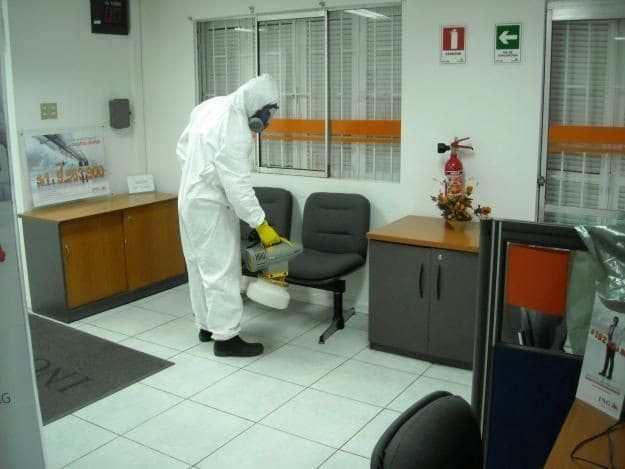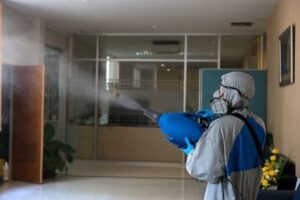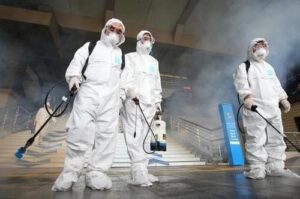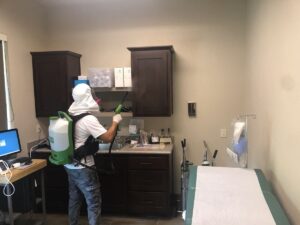
Coronations Disinfection Service in Dhaka Bangladesh, – 01781695325 01719198778, is a leading commercial disinfection company in Bangladesh. Operating out of Dhaka, cleaning services we are using broad-spectrum parricidal misting and fogging technology. Treatments are also available for residential, F&B/Restaurants and automotive environments.

Coronations Disinfection Service in Dhaka,
Regular disinfectants protect momentarily. Our professional disinfection system guarantees 99.99% efficacy while our advanced disinfection service lasts for months*
Viruses and germs like Human Coronations (OVID-19) can linger on surfaces for up to 6 days.
We only utilize professional-grade disinfectant solutions that are EPA approved and EN 14476 Certified. It is recommended by CDC, WHO and UK Department of Health for effective disinfection of Coronations.
Up to 3-months* of protection against viruses and bacteria on treated surfaces.

VIP Sheba BD
Disinfectants for Use Against SARS-Cov-2, Conforms to UK Department of Health, HAP and WHO guidelines for isolation, terminal and general environmental cleaning and disinfection.
*Treated surface must not be compromised by heavy touching or regular wiping to maintain protection. For high traffic areas & touch zones the protection can be compromised, and its efficacy can be reduced to a maximum of 10 days. Refer to our Advanced Disinfection Service for long-lasting virus protection.

Disinfection & Sanitization Services in Dhaka
PROFESSIONAL DISINFECTION SERVICES
Select from our comprehensive packages designed for your disinfection needs. For a more detailed quote please fill the out the form above and we will get back to you as soon as possible.
Full onsite vulnerability assessment
Sealing and protection of exposed electrical points
Wiping down of high-touch areas using hospital-grade disinfectant
Bio-fogging, misting or electrostatic distribution of disinfectant
Issuance of completion certification & report (if required at additional cost)
Satisfied with the whole process and the service. They were helpful and willing to answer all queries regarding the process. Would recommend it to anyone willing to sanitize their residences, vehicles pest control in dhaka
We can help to maintain and modernize your solve various infrastructure-specific issues a business may face.
Bangladesh logged 305 new OVID 19 infections and eight deaths on February 6th, 2021. That was the lowest single day new infection and death rates recorded in the country in more than nine months. Fast forward to July 1st of the same year, Directorate General of Health Services (DGHS) issued a press release confirming 8,301 new cases with 143 people losing their lives to the Coronations one a single day. The highest ever single day infection and death rate recorded by the country since the beginning of the pandemic. ICU in all hospitals in Dhaka city treating COVID 19 patients started witnessing a sudden surge in the patient admissions. Many of them operating at full or near full capacity. Families of infected patients are struggling to find an ICU bed in the city’s already fragile healthcare infrastructure. Struggling to control the spread of the virus, the government have announced a nationwide lock down starting from 1st July, 2021. VIP Sheba BD,
So what happened in these few months that brought the whole nation to a halt? Again.
For one thing, gross negligence among citizens in following public safety protocols is a definite consideration.
Proper face covering and frequently washing or sanitizing hands are proven to be an effective measures in curbing the spread of the virus. Yet, the country actually saw an overall decline in demand for various face masks and hand sanitizers amid the surge in infection rates. VIP Sheba BD,
Public health organizations such as the WHO and CDC both recommend maintaining at least one meter of distance between people in public spaces to prevent community transmission. However, we frequently witnessed massive gatherings with barely any space between in establishments like supermarkets and restaurants. Public transport services such as buses and trains were instructed to operate in 50% of their maximum capacity to maintain distance between passengers. Instead, we can assume that there was evidence of the rules not being enforced properly across the country, given the lack of public resources to monitor effectively. Particular incidences of mass gatherings have also contributed to the spike in the infection rates. Especially during the last Eid-ul-Fitr of the year which witnessed a large number of people leaving Dhaka city and returning to their hometowns. VIP Sheba BD,
However, the real reason behind this surge had already taken its roots just across the border. While Bangladesh was grappling with the existing SARS‑CoV‑2 at home, the virus had already taken up a much more threatening form in our neighboring country India. Causing their public health management and healthcare system to completely collapse. Health experts had warned that if the new variant of the Coronations enters Bangladesh from bordering India, the country could witness up to 20,000 new cases per day.
The Delta variant: an origin story
Unlike human beings, viruses are not that complex in their structure and function. They are essentially some form of protein shell coating a genetic material. It’s either DNA or RNA based. The genetic material is, in turn, made of molecules containing a series of instructions (code) that allows the virus to function. It only has one goal in life: to replicate itself. But the virus’ structure is too simple to carry out this task. Enter the host: humans.

Disinfection Sanitization Services in Dhaka
Once the virus enters our body, it uses our cells to make copies of itself. However, because the virus replicates itself multiple times, there is inevitably slight changes of the code in the genetic material of virus over time. It’s like they have changed or flipped a letter in a long paragraph. That virus with a slightly altered genetic material is called a variant.
More often than not, these variants are harmless and have no overall effect in the behavior or capabilities of the virus. Sometimes these mutations even make the virus weaker. This leads them to quietly disappear over time. However, other times these mutations can enhance the transmissible capabilities of the virus and make them more dangerous than their original form. This is what the scientists noticed happening to SARS‑CoV‑2 in the Indian state of Maharashtra back in October 2020. VIP Sheba BD,
Soon after it was discovered, it has since then widely spread throughout India and across the world. On May 8 this year, health officials detected the first case of the Delta variant in Bangladesh. The World Health Organization (WHO) labelled it a “variant of concern” (VOC) on May 11 along with three other variants such as Alpha (B.1.1.7), Beta (B.1.351), Gamma (P.1). Icddr,b study shows that the variant makes up to in Dhaka city today. 22 cases of variants originating from South Africa, Nigeria, and the UK were also discovered during this study. The variant has found its way to Bangladesh through the bordering districts with India, namely Dinajpur, Gaibandha, Bagerhat, Jhenidah, Pirojpur, Chapainawabganj, Gopalganj, and Khulna.
Just like every other virus, the SARS‑CoV‑2 is covered with protein spikes which they use to connect with and bind to infect human cells. However, this binding is not always a perfect fit. That gives our cell’s defense system an upper hand to prevent them from entering. The Alpha variant (B.1.1.7), which originated from the UK, emerged with multiple mutations on its spike protein. These mutations helped the variant to bind easily and quickly to human cells. Giving our immune system little time to conquer them. This meant now they can spread much faster than its original form. Thus, the Alpha variant swiftly became the most dominant variant of the Coronavirus in the UK and slowly spread all over the world, including Bangladesh. VIP Sheba BD,
All the four variants identified by the WHO as “variants of concern” have some form of mutation on their spike proteins. Making it ever so easier for them to evade our natural immune responses. What makes the Delta variant a bigger cause for concern is that it contains within it two significantly harmful mutations which emerged before: mutation makes the virus more transmissible. And a version of found in two other variants Gamma and Beta, makes it easier for the virus to re-infect people who already had COVID 19. These two mutations combined, makes the virus capable enough to dodge our natural immune response and evade our cells even faster.
, one comforting aspect is that they can’t make active decisions like humans do. They can’t think or strategize how to become more efficient in replicating themselves. Mutations, for good or worse, are products of pure chance and errors. However, the longer we let the virus spread among people, the more we’re allowing it to change. The more these changes accumulate over time, the higher the chances of the virus becoming stronger.
A good news is that the enhanced immune response we get from vaccines are much stronger than our natural immune response. So even though the virus may evade our natural defenses, we can response better with vaccinations. However, mass vaccination is a race against time. Even though Bangladesh is doing everything within its capabilities to secure vaccines from developed nations, it will take time before we can reach a herd immunity state through mass vaccination. VIP Sheba BD,
What’s wrong with using regular disinfectants against coronavirus? After all, we have been using disinfectants made of Chlorine, Chlorine dioxide, Phenol, Alcohols and others to get rid of viruses and bacteria for over a century now.
But it turns out, that’s precisely the problem. Just like all organisms, viruses and bacteria have evolved and mutated to adapt and form a level of resistance to these disinfectants. And Sars-Cov2 (Coronavirus), the virus that causes the life-threatening disease COVID-19, is no exception to the process of mutation and resistance to disinfectants. VIP Sheba BD,
Research shows that viruses by nature are more resistant to free chlorine than bacteria. Regular disinfectants have an Oxidation Potential (ORP) of about 1.36 V. This means that they are significantly weak in reducing virus and bacteria molecules to the point of permanent deactivation. Very high levels of chlorine may be needed for disinfection and this process can produce disinfection by-products such as Trigonometrical (THMs), Haloacetic acids and Bromate. Most of these oxidants can lyse algal and other cells, releasing liver and nerve toxins. Thus classifying them as low-level and harmful disinfectants. VIP Sheba BD,
We are available all over Bangladesh including:
Barguna District, Barisal District, Bhola District, Jhalokati District, Patuakhali District, Pirojpur District, Bandarban District, Brahmanbaria District, Chandpur District, Chittagong District, Comilla District, Cox’s Bazar District, Feni District, Khagrachhari District, Lakshmipur District, Noakhali District, Rangamati District, Dhaka District, Faridpur District, Gazipur District, Gopalganj District, Kishoreganj District, Madaripur District, Manikganj District, Munshiganj District, Narayanganj District, Narsingdi District, Rajbari District, Shariatpur District, Tangail District, Bagerhat District, Chuadanga District, Jessore District, Jhenaidah District, Khulna District, Kushtia District, Magura District, Meherpur District, Narail District, Satkhira District, Jamalpur District, Mymensingh District, Netrokona District, Sherpur District, Bogra District, Joypurhat District, Naogaon District, Natore District, Chapai Nawabganj District, Pabna District, Rajshahi District, Sirajganj District, Dinajpur District, Gaibandha District, Kurigram District, Lalmonirhat District, Nilphamari District, Panchagarh District, Rangpur District, Thakurgaon District, Habiganj District, Moulvibazar District, Sunamganj District, Sylhet District
We are available in entire Dhaka city including:
Adhabor, Azimpur, Neke Agargaon, Azimpur, BUET campus, Badda, Bakshibazar, Banani, Banani DOHS, Banasree, Bangshal, Baridhara, Baridhara DOHS, Basabo, Basundhara, Cantonment, Chouk Bazar, DU campus, Dakhin Khan, Dayaganj, Demra, Dhamrai, Dhanmondi, Dohar, Elephant Road, Farmgate, Gabtali, Gandaria, Gulshan 1, Gulshan 2, Hazaribagh, Jatrabari, Jurain, Kafrul, Kalabagan, Kalyan Pur, Kamala Pur, Kamrangirchar, Kathal Bagan, Kawran Bazar, Kazipara, Keraniganj, Khilgaon, Khilkhet, Kotwali, Lalbag, Lalmatia, Magh Bazar, Malibag, Mirpur, Mirpur DOHS, Mohakhali, Mohakhali DOHS, Mohammad Pur, Motijheel, Nakhal Para, Narinda,Nawab Ganj, Naya Paltan, New Eskaton, New Market, Nilkhet, Pallabi, Panthapath, Postagola, Purana Paltan, Purbachal, Raja Bazar, Rajarbag , Ramna, Rampura, Rayer Bazar, Rupnagar, Sabujbag, Sadarghat, Savar, Segunbagicha, Shahbag, Shajahan Pur, Shampur, Shantinagar, Sher-e-BanglaNagar, Shyamoli, Shamoli, Siddeswary, Sutrapur, Tejgaon, Tonggi, Uttar Khan, Uttara, Wari, Zigatola, Aftab Nagor, Bonosri, Estarn Housing, Nikunja

disinfection services in dhaka
Address: 154, 11/A W Nakhalpara Rd, Dhaka 1215
Hours:
Open 24 hours
Phone: 01962-180678 01719198778,
Office Address: 154/11/A, West Nakhalpara, Tejgoan, Dhaka, 1215, Mobile no: +880 1719 198 778, +880 1999 979 411, Website: vipshebabd.com